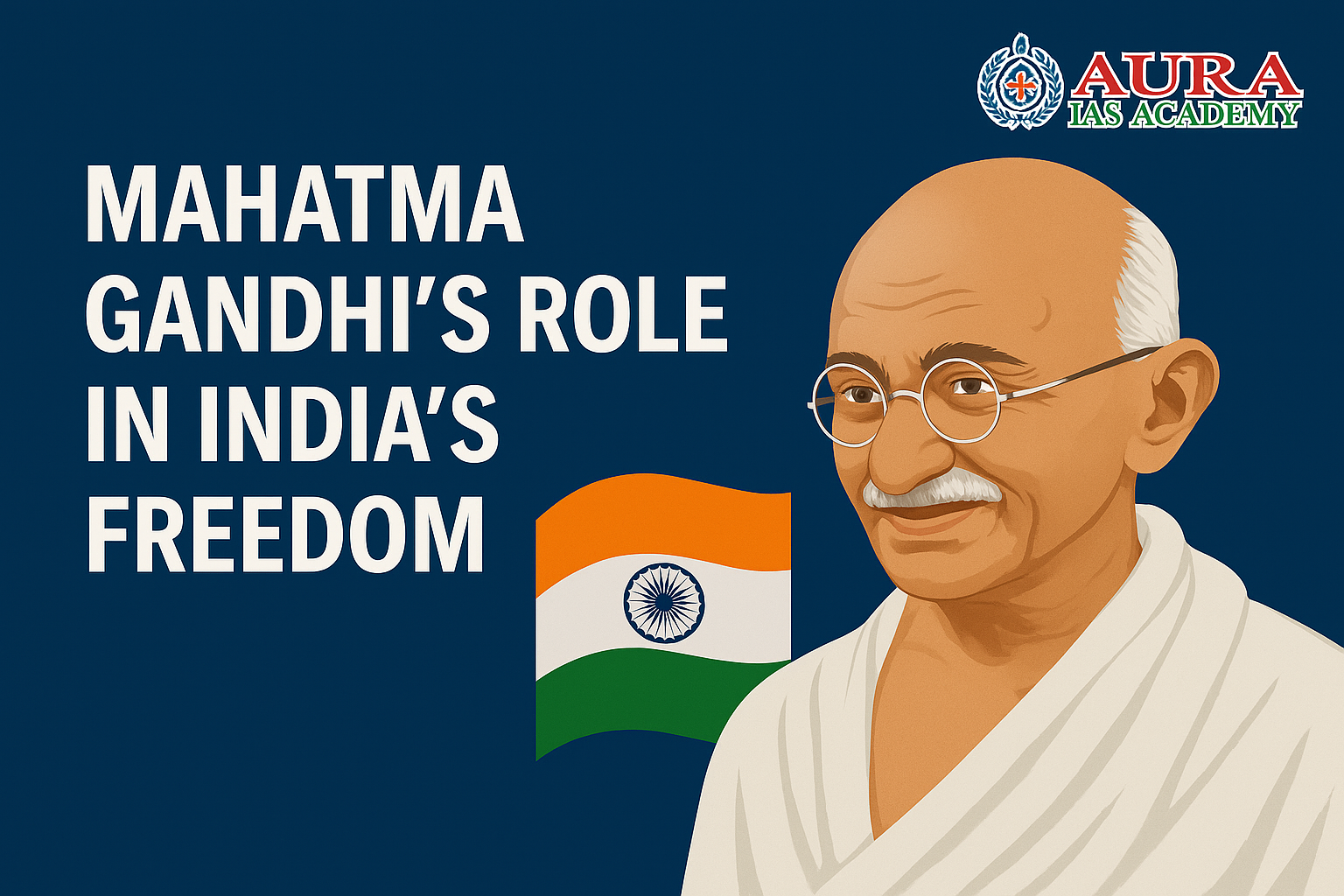Gandhi’s Vision: Shaping India’s Freedom and Moral Nation-Building

More than seven decades after independence, Mahatma Gandhi’s ideas continue to define India’s socio-political fabric and moral imagination.
His philosophy was not confined to achieving political freedom but to building a just, self-reliant, and ethical society.
For UPSC aspirants, Gandhi’s vision links directly to GS Paper 1 (Freedom Struggle), GS Paper 4 (Ethical Leadership), and the Essay Paper (Social-Political Ideals).
Background: From South Africa to India’s Freedom Movement
In 1915, Gandhi returned to India after two decades of socio-political work in South Africa.
There, he had successfully experimented with Satyagraha, a unique method of resisting injustice through non-violent moral force.
Back in India, Gandhi infused ethics, simplicity, and mass participation into the freedom struggle — transforming a fragmented political movement into a nationwide people’s revolution.
Core Ideological Foundations
🕊️ Satya (Truth) and Ahimsa (Non-Violence) – Gandhi considered truth as divine and believed that only non-violence could lead humanity towards lasting justice.
⚙️ Sarvodaya (Welfare of All) – He envisioned an inclusive society where economic and social progress reached the poorest, a precursor to the idea of Antyodaya.
🏡 Swaraj (Self-Rule) – Gandhi’s Swaraj went beyond political freedom; it meant self-discipline, local governance, and moral self-restraint.
💼 Trusteeship & Ethical Economics – He proposed that wealth and industry must serve social welfare, forming the foundation for Corporate Social Responsibility (CSR) today.
🌿 Simplicity & Sustainability – Gandhi’s preference for khadi, handcrafts, and minimalism resonates with modern sustainable living and local production models.
Major Campaigns of the Freedom Movement
🇮🇳 Non-Cooperation Movement (1920–22) – Urged Indians to boycott British goods and institutions, transforming resistance into a national awakening.
⚖️ Civil Disobedience Movement (1930–34) – The Dandi Salt March symbolized defiance against unjust colonial laws.
🕊️ Quit India Movement (1942) – Marked the final, uncompromising call for British withdrawal.
📖 Constructive Programme – Promoted education, communal harmony, and rural upliftment to strengthen India from within.
Impact on India and the World
📈 1. Democratization of the Freedom Struggle
Gandhi brought farmers, women, and laborers into the national movement, creating a participatory democracy before independence.
💬 2. Moral Politics
He redefined politics as an extension of ethics — where power must serve conscience and truth.
🌏 3. Global Influence
Leaders like Martin Luther King Jr. and Nelson Mandela adapted Gandhian non-violence in their own liberation struggles.
⚖️ 4. Post-Independence Legacy
Concepts like Gram Swaraj, Khadi, and Panchayati Raj were embedded into India’s governance and rural development structure.
Relevance of Gandhian Thought Today
Decentralized governance inspires India’s local self-government reforms.
Sarvodaya and Antyodaya influence welfare schemes and poverty eradication programmes.
Trusteeship underpins corporate ethics and responsible capitalism.
Ahimsa aligns with India’s foreign policy ideal of peaceful coexistence.
UPSC Relevance
GS Paper 1: Modern Indian History – Role of Gandhi in National Movement.
GS Paper 2: Moral Leadership and Governance Ideals.
GS Paper 4: Ethics – Truth, Non-Violence, and Conscience-based Decision-Making.
Essay Paper: “Politics without morality is a body without soul.”
💡 Example UPSC Question:
“Assess the relevance of Gandhian philosophy in contemporary India’s socio-economic and governance framework.”
Way Forward
In the age of materialism and polarization, India’s strength lies in reviving Gandhian values of empathy, decentralization, and sustainability.
Integrating these principles into governance and civil society can foster a moral democracy that balances growth with compassion.
Conclusion
Mahatma Gandhi’s life was a continuous experiment in truth — blending spirituality, politics, and social service.
His ideals remain not just relics of the past but a roadmap for the future.
By practicing his message of “Be the change you wish to see in the world,” India can continue to be guided by moral courage and collective conscience.
📘 For UPSC Aspirants – Recommended Reading
Aura IAS GS Paper 1 PYQs (2013–2025)
✔️ Modern History, Freedom Struggle, Ethical Leadership & Governance
🛒 Explore Here: 👉 https://auraias.in/shop



